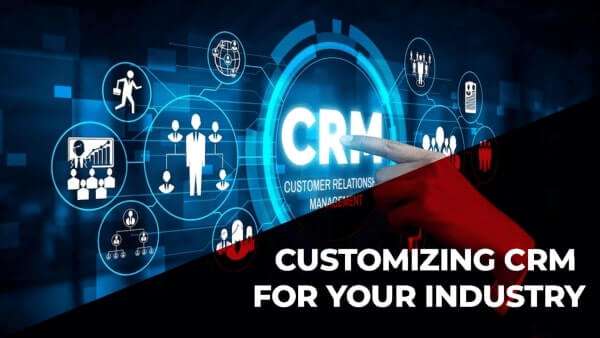Customizing CRM in Malaysia
Introduction
Customer Relationship Management (CRM) is a software system designed to manage and nurture customer relationships. CRM collects, analyzes, and utilizes data to understand customer behavior and preferences to build strong customer relationships.
CRM offers a centralized platform for businesses to track interactions, improve customer service, and streamline sales and marketing efforts. Most importantly, CRM provides customization to fit your business’s unique workflows.
Importance of Customizing CRM in Malaysia
Malaysia has a vibrant and diverse landscape, which requires Customizing CRM to align with different needs and requirements. With customized CRM, businesses earn an edge to stay ahead in the competitive Malaysian market.
Here are some key reasons why CRM customization is crucial for businesses in Malaysia:
Cultural Sensitivity: Malaysia is a multicultural nation with ethnicities, languages, and customs. Customizing CRM in Malaysia allows businesses to tailor their approaches to resonate with specific cultural norms, ensuring that communication and engagement strategies are respectful and effective.
Language Adaptation: The ability to customize CRM systems to communicate in multiple languages is vital in Malaysia, where there are various languages. This facilitates more effective customer interactions and support.
Local Market Insights: Malaysia’s business environment is distinct, with regional variations in consumer behavior and preferences. Customizing CRM enables businesses to gather and analyze data specific to local markets, helping them make informed decisions and create targeted marketing campaigns.
Regulatory Compliance: Malaysia has its set of data protection and privacy regulations. CRM customization ensures that customer data is managed per local laws, reducing the risk of legal complications and enhancing customer trust.
Industry Specificity: Different industries in Malaysia may require unique CRM functionalities. Customization allows companies to cater to the specific demands of their sectors, be it retail, finance, or manufacturing.
Understanding CRM Implementations
Key Elements of CRM
CRM encompasses various elements, and understanding them is essential for a successful CRM implementation. Here, we’ll define these elements:
Customer Data Management: CRM systems collect and organize customer data, including contact information, purchase history, communication history, and preferences. This information helps businesses better understand their customers, allowing for personalized interactions and targeted marketing.
Lead and Opportunity Management: CRM tools enable the tracking and nurturing of leads and opportunities. This involves monitoring potential customers, their journey through the sales funnel, and the actions needed to convert them into paying customers.
Sales and Pipeline Management: CRM systems assist in managing sales teams, tracking their performance, and visualizing the sales pipeline. This helps in forecasting revenue and optimizing sales strategies.
Customer Support and Service: CRM solutions often include customer support and service modules, allowing businesses to track and resolve customer inquiries and issues efficiently.
Marketing Automation: CRM tools offer automation features for creating and managing marketing campaigns, email marketing, and lead nurturing.
Analytics and Reporting: CRM systems provide analytics and reporting capabilities, allowing businesses to gain insights into customer behavior, sales performance, and overall CRM effectiveness.
Tailoring CRM for Industry-Specific Needs
Every industry has unique requirements and challenges. Customized CRM systems are often essential to cater to these industry-specific needs. Here’s why customization is necessary:
Industry Regulations and Compliance: Different industries are subject to specific regulations and compliance requirements. CRM customization ensures that data management and customer interactions align with these regulations, reducing the risk of legal issues and fines.
Workflows and Processes: Industries often have distinct workflows and processes. Customizing CRM allows businesses to tailor these processes to their specific industry, improving efficiency and productivity.
Data Fields and Attributes: Each industry may require different data fields and attributes to track and manage customers effectively. Customizing CRM allows industry-specific data fields, ensuring the correct information is collected and utilized.
Integration with Industry-Specific Tools: Many industries rely on specialized software and tools. Customization enables seamless integration with these tools, enhancing productivity and allowing a holistic view of customer data.
Reporting and Analytics: Industry-specific metrics and KPIs are essential for success. CRM customization allows tailored reports and analytics relevant to a particular industry, aiding decision-making.
Addressing the Unique Needs of Large-Scale Businesses in Malaysia
Importance of Scalability
Scalability is a critical consideration for large enterprises for several reasons:
Handling Growth: Large enterprises grow and expand over time. Scalability ensures that their IT infrastructure, applications, and processes can grow with them. Therefore, as the organization expands, CRM can handle increased data, user loads, and transaction volumes without major disruptions.
Cost-Efficiency: Large companies can optimize their resources efficiently by scaling up or down resources based on demand. This approach helps avoid unnecessary costs during periods of low demand while ensuring customer needs are met during peak times without causing performance issues.
Competitive Advantage: In today’s fast-paced business environment, enterprises that can quickly adapt to changing market conditions have a competitive advantage. Scalability allows businesses to respond to shifts in customer demands, market dynamics, and technology trends with agility.
Enhanced Customer Experience: Scalability is vital for providing a seamless customer experience. Large enterprises often serve a significant customer base, and scalability ensures that systems, such as e-commerce platforms or customer support, can handle high loads without degradation in service quality.
Resilience and Disaster Recovery: Scalable systems are more resilient and capable of disaster recovery. By distributing workloads and data across multiple servers or data centers, enterprises can minimize the risk of downtime due to hardware failures or disasters.
Future-Proofing: Scalability ensures that an enterprise’s IT infrastructure is future-proof. It can adapt to new technologies, incorporate emerging trends like IoT or AI, and integrate with evolving business processes and requirements.
Global Expansion: For large enterprises with a global presence, scalability is crucial for accommodating regional differences in demand, regulations, and cultural expectations.
Integrating Local Regulations and Compliance
Customizing CRM in Malaysia regulatory landscape is essential for businesses. Here’s how CRM customization can help:
Data Protection and Privacy: Malaysia has data protection laws, and businesses must adhere to these regulations to protect customer data. CRM customization can include features for data encryption, access control, and audit trails to ensure compliance with data privacy laws.
Anti-Spam Regulations: Malaysia has strict anti-spam regulations, and they can include opt-in and opt-out features for email and SMS marketing. Additionally, CRM can assist in managing customer preferences for communication channels.
Financial Regulations: Certain industries in Malaysia, such as financial services, are subject to specific regulations. CRM customization can include modules and workflows that help manage financial transactions, compliance reporting, and customer due diligence.
Reporting and Record-Keeping: Tailored CRM systems generate reports compliant with Malaysian regulatory requirements. This includes documentation of customer interactions, transactions, and other relevant data for audit and compliance purposes.
Localization and Language Support: CRM customization can ensure that the system is available in the local language and can handle special characters used in Malaysian script. This facilitates effective communication and engagement with local customers.
Tax Compliance: Malaysia has specific tax regulations. Customization of the CRM can integrate tax calculations and reporting to ensure businesses comply with tax laws and regulations.
Workflow Automation: CRM customization can include workflow automation to ensure business processes align with local regulations. This can help in automating compliance checks and verification steps.
Employee Training and Compliance Tracking: CRM can be customized to track employee training on regulatory matters and ensure that staff members are aware of and adhere to relevant regulations.
Multi-channel Integration for Large-scale Operations
In the context of large-scale businesses in Malaysia, integrating multiple communication channels is highly significant for several reasons:
Enhanced Customer Engagement: Large enterprises often cater to diverse customer demographics. Integrating multiple channels such as email, phone, chat, social media, and in-person interactions allows them to engage with customers through their preferred communication method. This personalized approach can lead to higher customer satisfaction and loyalty.
Improved Responsiveness: Multi-channel integration ensures customer inquiries and requests are addressed promptly, irrespective of the channel. This responsiveness is vital for maintaining a positive customer experience, especially in a competitive marketplace like Malaysia.
Efficient Issue Resolution: Multi-channel integration allows for a centralized view of customer interactions, making tracking and resolving customer issues easier. This reduces the risk of duplication or missed customer queries.
Data Consistency: When businesses integrate multiple channels, they can ensure that customer information is consistent across all touchpoints. This consistency leads to better quality of customer data, which can be used to make informed decisions based on a unified view of the customer.
Insights: The data collected from multiple channels can provide valuable insights into customer preferences, behavior, and pain points. This information can be used to refine marketing strategies, product offerings, and customer service approaches.
Competitive Advantage: In a large-scale business setting in Malaysia, offering a seamless and consistent multi-channel experience can set a company apart from its competitors, attracting and retaining customers.
Compliance Management: Integration also aids in compliance with regulatory requirements, as all customer interactions and data are recorded and can be monitored as needed.
Target Audience and Their Specific Needs
Identifying the Target Audience
The target audience for Customizing CRM in Malaysia can vary depending on the nature of the business and its specific goals. However, broadly speaking, the primary target audience for CRM customization typically includes:
Sales Teams: Sales professionals often use CRM systems to manage leads, track customer interactions, and close deals. They need CRM customization to streamline their sales processes and access critical data easily.
Customer Support Teams: Customer support teams rely on CRM to manage customer inquiries, complaints, and requests. Customization can help them categorize and prioritize customer issues efficiently.
Marketing Teams: Marketing professionals use CRM to segment the customer base, plan targeted campaigns, and analyze customer data. CRM customization can assist in creating personalized marketing strategies.
Management and Executives: Company executives and management need CRM data for making informed decisions and assessing the overall health of the business. Customization can provide them with relevant dashboards and reports.
IT and System Administrators: IT professionals are responsible for maintaining the CRM system. Customization may include technical configurations, security settings, and integrations to make CRM work seamlessly within the organization’s tech ecosystem.
Customers: In some cases, businesses may offer limited CRM access to customers for self-service purposes, such as tracking orders or managing accounts.
Tailoring CRM Features for the Audience
To align Customizing CRM in Malaysia with the specific needs of the target audience, it’s essential to consider the following:
Sales Teams:
- Customizable dashboards with sales pipelines and lead management features.
- Integration with email and calendar tools to manage appointments and follow-ups.
- Automation of repetitive tasks, such as data entry and lead nurturing.
- Detailed reporting on sales performance, conversion rates, and revenue.
Customer Support Teams:
- Custom ticketing systems and categorization of customer inquiries.
- Knowledge base integration for quick access to support documentation.
- Customer history and interaction tracking for personalized assistance.
- Priority and service level agreement (SLA) management.
Marketing Teams:
- Segmentation tools for targeted marketing campaigns.
- Email marketing integration for personalized email communication.
- Social media integration for monitoring customer sentiment and engagement.
- Analytics and A/B testing for campaign optimization.
Management and Executives:
- High-level dashboards with key performance indicators (KPIs) and financial data.
- Custom reports and data visualization tools for decision-making.
- Forecasting and budgeting features to plan for the future.
- Security and access controls to protect sensitive data.
IT and System Administrators:
- Customization of user roles and permissions to control access.
- Integration with existing software and databases.
- Data backup and security configurations.
- Scalability and system performance optimization.
Customers:
- Self-service portals for managing accounts, orders, and inquiries.
- Knowledge bases and FAQ sections for finding answers independently.
- Order tracking and history features.
Achieving Business Goals Through CRM Customization
Improving Operational Efficiency
CRM customization plays a significant role in improving operational efficiency within an organization. Here are some key ways CRM customization leads to operational efficiency:
Process Streamlining: Customizing a CRM system automates and streamlines workflows, data entry, task assignment, and communication, reducing manual effort and minimizing errors.
Data Centralization: CRM systems integrate data from various sources, centralizing customer information and making it easily accessible to different teams, which ensures that all employees have a comprehensive view of customer interactions.
Automated Workflows: CRM customization enables the automation of repetitive tasks, such as lead nurturing, follow-ups, and data entry. This not only saves time but also ensures that these tasks are consistent and without delays.
Data Analytics: Customized CRM systems can provide in-depth analytics and reporting features. These insights help businesses identify trends, track performance, and make data-driven decisions, leading to more efficient strategies.
Improved Communication: CRM customization can facilitate better communication among teams and customers. For example, it can automate notifications, reminders, and alerts, ensuring that team members are always informed and respond promptly to customer needs.
Scalability: Customization allows a CRM system to grow with the business. As the organization expands, add new custom features to accommodate new requirements to ensure operational efficiency even during growth.
Enhancing Customer Satisfaction
CRM customization plays a vital role in enhancing customer satisfaction by enabling businesses to provide more personalized and responsive service. Here’s how Customizing CRM achieves this:
Customer Data Centralization: CRM customization allows businesses to gather and centralize customer data from various touchpoints. This means that customer service representatives have a complete view of each customer’s history, preferences, and interactions, enabling more personalized interactions.
Personalized Communication: Custom CRM systems can automate personalized communication, such as birthday greetings, special offers, or follow-up messages. This makes customers feel valued and understood.
Efficient Issue Resolution: CRM customization can categorize and prioritize customer issues based on their severity or importance. This ensures that critical issues are addressed promptly, leading to higher customer satisfaction.
Customer Feedback Analysis: Customized CRM systems can include features for capturing and analyzing customer feedback, allowing businesses to identify areas for improvement and respond to customer concerns effectively.
Self-Service Options: CRM customization can provide self-service options for customers, such as portals for tracking orders, managing accounts, or finding answers to common questions. This empowers customers to resolve issues independently, improving their overall experience.
Communication History: With customized CRM, businesses can maintain a history of customer interactions, ensuring that every customer conversation is contextual and informed, leading to more satisfying customer experiences.
Measuring ROI on Customizing CRM in Malaysia
Measuring the return on investment (ROI) for CRM customization is essential to evaluate the impact of the investment and make data-driven decisions. Here are some insights on how to measure the ROI on Customizing CRM:
Define Clear Objectives: Start by setting clear objectives for your CRM customization project. Identify what you aim to achieve, whether it’s improved sales, customer satisfaction, or operational efficiency.
Cost Analysis: Calculate the total costs of Customizing CRM, including software, implementation, training, and ongoing maintenance, which will be used in the ROI calculation.
Track Key Performance Indicators (KPIs): Monitor KPIs related to your objectives.
Compare Before and After: Compare the performance before Customizing CRM with the performance after implementation. This comparison helps in assessing the impact of customization on your chosen KPIs.
Periodic Review: Regularly review and update your ROI analysis to ensure that customization continues to provide value over time. CRM systems and business needs evolve, so ongoing evaluation is crucial.
Consider Soft Benefits: In addition to quantifiable gains, consider the soft benefits of Customizing CRM, such as improved customer satisfaction and employee productivity. While these benefits may not be as easily quantified, they contribute to the overall value of customization.
Conclusion
With evolving market dynamics, it has become crucial to adopt industry-specific CRM solutions and harness the power of Customizing CRM to optimize business operations and stay competitive in the Malaysian business landscape.
Explore Customizing CRM strategies as an opportunity to enhance industry-specific CRM, improve business efficiency, and future-proof your operations. By investing in CRM integration and tailored CRM solutions, you can unlock the full potential of customer relationship management, enabling your business to thrive in the ever-evolving Malaysian marketplace.
Make the move towards Customizing CRM today to achieve optimal results and secure your business’s success in the future. Contact us to book a free demo today!
Frequently Asked Questions (FAQs)
- What is CRM customization, and why is it important for businesses in Malaysia?
CRM customization refers to tailoring a Customer Relationship Management system to meet the specific needs of a particular industry or business. It is vital for businesses in Malaysia as it allows them to optimize their CRM to align with industry-specific processes and enhance operational efficiency.
- What are some examples of industry-specific CRM customizations for Malaysia?
Examples include custom modules for financial services, e-commerce integration for retail, case management for customer support in tech industries, and special reporting for manufacturing.
- What steps should businesses take to initiate Customizing CRM in Malaysia?
Businesses should start by identifying their specific industry requirements, choosing the right CRM platform, and partnering with CRM experts who understand the Malaysian business landscape.
- How long does it take to complete a CRM customization project for an industry in Malaysia?
The timeline varies depending on the complexity of the project, but a well-planned CRM customization can typically be completed within a few months.
- How do I measure the success of CRM customization in my Malaysian business?
Success can be measured through key performance indicators (KPIs) such as improved efficiency, customer satisfaction, and increased revenue, in line with the specific goals set for the Customizing CRM project.








